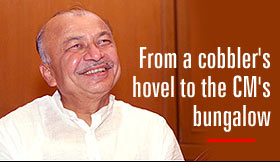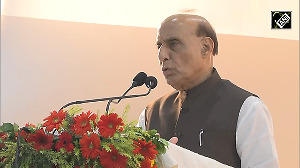
Not often will you find the personal assistant of a politician ready with his curriculum vitae moments after he is chosen to head a state government.
Sushilkumar Sambhaji Shinde's case was different. The member of Parliament from Solapur was so certain of succeeding Vilas Deshmukh as chief minister of Maharashtra that he had told his aide to make at least 100 copies of his 'bio-profile' to be distributed to reporters.
Mind you, the CVs were meant exclusively for reporters. The aide made sure to ask "are you from the media?" before handing the precious document over.
This is how it opens: 'Shri Sushilkumar Shinde, though he belongs to a Scheduled Caste Community, fought from a general Lok Sabha Constituency -- Solapur-37, in March 1998 and again for the second time in October 1999; and won with a margin of over one lakh, four thousand; and seventy seven thousand votes, respectively.'
Shinde was born on September 4, 1941, in a very poor family in Sholapur. His father was a cobbler by profession and the family struggled to even fulfil its basic needs.
"But he always had the desire to do something in life," said long-time associate Jayant Patil. "He studied hard and also worked as a bailiff in a Solapur court before becoming a sub-inspector of police. He also studied law. I am glad to see him become Maharashtra's first dalit chief minister."
Patil said he had only come to congratulate Shinde. "He is always humble and talks politely to everyone," he said. "Besides being interested in literature and classic films, he is also interested in sports. Not many people know that he likes to play badminton."
The poet Ramdas Phutane, former Congress member of the legislative council and producer of Marathi film Saamna, said, "Our film had got entry to the Berlin Film Festival and they invited us over. But we had no money to go to Berlin. Someone told us to approach Shinde, who was the culture minister then. But I was a little hesitant because I didn't know him that well. Later on, when we approached him, he surprised me with his warmth and took personal interest to get me and my director tickets to Berlin."
That was almost 25 years ago. Since then Phutane has been a friend of Shinde. "He is a great admirer of art and literature and therefore we got along very well," he said.
Since the late 1980s, Shinde has been among the top contenders for the chief minister's post in Maharashtra, but every time he lost out because he does not belong to the dominant Maratha community, which constitutes more than 30 per cent of the state's population.
This is why, as soon as he won the race this time, Shinde told the Congress legislature party: "Maharashtra is a progressive state and we have always believed in tolerance for all religions and castes because of the blessings of Shahuji Maharaj, Mahatma Jyotiba Phule and Dr B R Ambedkar. And it is only the Congress party which can give a chance to a man from such a poor background."
Besides keeping the Maratha lobby in check, Shinde has two other major tasks: managing the rather large coalition of eight parties and 11 independents that is the Democratic Front, and tackling the state government's huge debt of nearly Rs 78,000 crore [approximately US $16.25 billion].
But the 61-year-old politician is confident. "I can handle them," he said, "as I have worked earlier in coalition governments and know how they work. And let me remind you that I have presented the budget of Maharashtra as the finance minister and know how to get out of the current crisis."
One of Shinde's supporters remarked, "When Marathas can work with A R Antulay, a Muslim chief minister, why can't they work with Sushilkumar Shinde? After all, isn't this the land of Babasaheb Ambedkar and Mahatma Phule?"
Encouraged by Sharad Pawar, then a rising young Congress politician, in 1971, Shinde had quit his sub-inspector's job to enter politics. He contested an assembly by-election from Karmala in Solapur three years later and won the election by 25,000 votes. In November that year, the late V P Naik, then the chief minister, made Shinde a junior minister in his government.
In 1978, Shinde resigned from the Congress as well as the Vasantrao Patil government and joined the Progressive Democratic Front government led by Pawar. After the PDF government was dismissed in 1980, Shinde remained with Pawar and contested and won the assembly election in June that year as a member of his Congress (Socialist).
But less than three years later Shinde fell out with his mentor and returned to the Congress, to become the finance minister in the government headed, once again, by Vasantrao Patil. Since then, relations between him and Pawar were strained, until now.
When Pawar himself rejoined the Congress in 1986, Shinde was among those who opposed the move, along with Chief Minister S B Chavan and Deshmukh, the man he replaces now, but the late Rajiv Gandhi, then prime minister and party president, brushed their objections aside.
Yet, barely five years later, Shinde and Deshmukh decided to revolt against the leadership of Pawar, who had by then become chief minister, but were overtaken by events. In 1991, Rajiv Gandhi was killed, Pawar moved to the Centre as defence minister, and a year later, Shinde himself gave up his ministership and was elected to the Rajya Sabha.
In between, in November 1989, Shinde achieved the distinction of being the only finance minister in India to present nine successive budgets.
Once he moved to the Centre, Shinde left state politics behind and began concentrating on building a career in New Delhi. Once his Rajya Sabha term expired, he contested the 1998 Lok Sabha election and won it handsomely even though he did not contest from a reserved constituency. He repeated his feat the following year, though with a reduced margin.
Over the years, he has gained the trust of Congress president Sonia Gandhi. He acted as her campaign manager in Amethi, Uttar Pradesh, in 1999. Sonia won the seat with the biggest margin of the 1999 election.
Last year, at her instance, he even entered the vice-presidential contest against National Democratic Alliance nominee Bhairon Singh Shekhawat, knowing fully well that it was a lost cause.
The ever-smiling Shinde is reputed to have very few enemies in politics. One of those who opposed the move to make him chief minister was Vijaysinh Mohite-Patil of the Nationalist Congress Party, who also hails from Solapur and feared that Shinde would eat into his support base after his elevation. Shinde had a separate meeting with Mohite-Patil on Thursday to allay his fears.
Shinde has cordial, even friendly, relations with many opposition leaders too, including the likes of the Shiv Sena's Bal Thackeray and Manohar Joshi. Asked how his becoming chief minister would affect his friendships, Shinde said, "Friendship is different and political rivalry is different. I will not do anything that will hamper my party's prospects."
Ironically, one of his closest associates is the man he has replaced now, Vilas Deshmukh. Shinde quipped, "When I left Maharashtra for New Delhi, everyone told me that hanso ka joda bichad gaya (two best friends have been parted). I am glad to come back and work with Vilasrao again."





